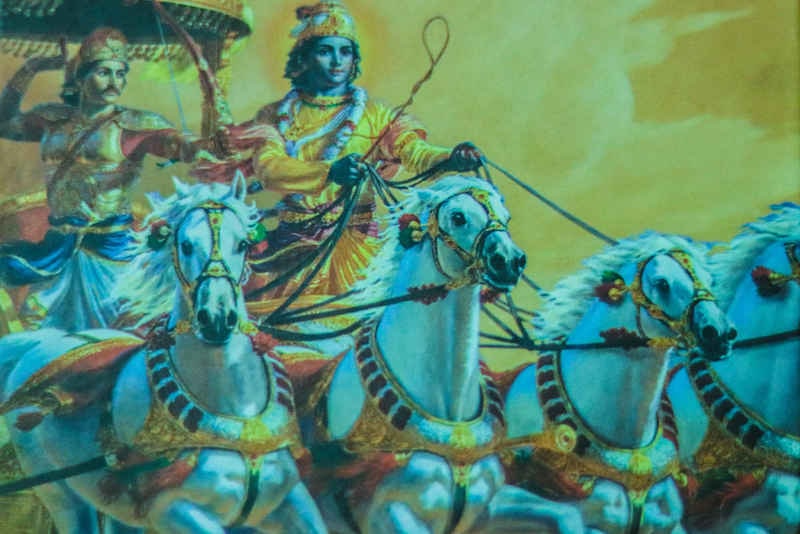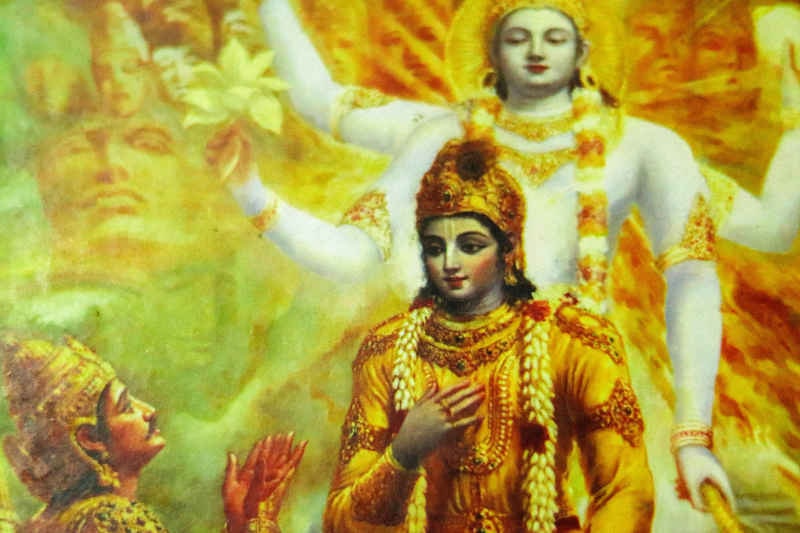Equanimity in Bhagawat Geeta – Part II | Equanimity talk by Bhagawat Geeta
Before reading this article Please, read Equanimity in Bhagawat Geeta Part-I then start this article. equanimity in Bhagawat Geeta becomes more clear in Chapter 5 verse number 18th to 23rd,-“The intelligent person perceives with equanimity on all and whole whether it be a Brahman thriving with wisdom and delicacy, a cow, an elephant, a dog, and a castaway.
A person established in equanimity has conquered the mortal plane even here, since the Absolute (is also established in equanimity) is untouched by malevolent and is the equanimous (same) to all, consequently, they are founded in Paramatma (God). He who, with stable wit released from suspicion be pleased not on getting pleasant and does not perturb to the unpleasant, that knower of God lives constantly in affinity with God.
He, whose mind abides unattached to sense objects, achieved through meditation, the sattvika pleasure which resides in the mind, becoming totally identical with Brahma, revels everlasting ecstasy. The enjoyments which are born of sense-contacts; are a source of misery. They are ephemeral; have a start and expiry, they come and go. Thus, a wise man should not indulge in them. He, who can endure the urges of lust and rage in this life, before the ruin of this body, is a yogi and a blissful person.”
The following things can be found on equanimity in Bhagawat Geeta in 6th chapter, verse number 7 to 9,-“The supreme spirit has dwelled in the wisdom of the self-controlled man whose mind is completely tranquil in the middle of two opposites, such as chill and heat, pleasure and misery, admiration and slander.
The yogi whose mind is satiated with Jnana (knowledge of unmanifest divinity), vijnana (knowledge of manifest God) who is irrevocable under any situation, whose senses are entirely under control, and to whom mud, rock, and gold are all similar, is said to be a God-realized soul. He who perceives upon well-wishers, friends, enemies, who are indifferent, mediators, relatives, opponents, pious and sinful with equanimity, is great.”
Among many reasons, one reason to look with equanimity is that the Self is present everywhere, in other words- everything is the manifestation of the Self. Lord speaks in verse no. 29,-“The Yogi who is connected with the omnipresent infinite consciousness, whose sight is even, perceives the Self-existing in all beings and all creatures as approved in the self.” He further explains in verse 32,-“Arjuna, whoever looks on all as one, on the identity of his own self and perceives upon the rejoice and sorrow of all equally- such Yogi is the supreme of all.

The Lord reveals that equanimous person is dear to him in chapter 12, verse number 13 to 19,-“ He who is apart from hatred towards all beings, matey and compassionate, no feeling of ‘I’ and ‘mine’ equanimous in pain and pleasure, remissive, ever-satisfied and mentally unified with Me, as well, he has controlled his mind, sense, and body with determined resolve and devoted his mind and intellect to Me- that devotee is dear to Me.
He who does neither create annoyance to his fellow-creatures nor feel vexed with them, and who is untouched by happiness and sadness, discomfort and fear, is dear to Me. He who longs nothing, who is both internally and externally clean, is intelligent, impartial, indifferent and has emerged above all distractions, and who gives up the feeling of doership in all actions- such devotee is beloved to Me. He who neither becomes happy nor hates, nor mourns, nor hankers, and who resigns both good and bad undertakings and fully devoted, is favorite to Me.
He who behaves equally with ally and enemy, remains coequal in hospitality and infamy, who is the same in heat and cold, joy and suffering, and other opposite experiences, is free from craving who regards honour and ignominy alike, and is in rumination and is satisfied with any means of surviving, enjoying no feeling of ownership and clinging regarding residing place and is entirely devoted to Me, is dear to Me. This chapter explains Equanimity in Bhagawat Geeta in a depth manner.
The God explains the equanimity in Bhagawat Geeta in various ways. In the 13th chapter, verse 9, he says,-“Absence of craving and the feeling of mineness for son, wife, home, etc. and permanent equipoise of mind both in the suited and unsuited situation.. (is knowledge). He sees reality, who sees highest Lord as indestructible and dwelling equally in all mortal creatures, both animate and inanimate.
He attains the supreme state by seeing the supreme Lord equally in all, seeing the Lord in all he does not kill the Self. He further says in 27th and 28th chapter,-“One who sees the supreme lord as imperishable and dwelling equally in all mortal beings, both animate and inanimate, he sees truth, as, by perceiving the supreme Lord equally present in all, he does not ruin the Self by himself (nor he ruins other), thus attains the highest state.”
He who has risen above all three Gunas is an equanimous person. In other words, an equanimous person becomes above all the three Gunas. The Lord reveals the characteristics of such person in the 14th chapter from 22nd verse to 25th to elaborate the equanimity in Bhagawat Geeta. He who does not loathe fluorescence (born of Sattva) and activity (born of Rajas), and nor becomes swoon (which is born of Tamasa), when prevailing, nor wants for when they are no more.
He, who remaining as a witness, is not unsettled by Gunas realizing that Gunas alone move among the Gunas, stays fixed to unite with God and never falls behind from that state. He who is constantly dwelled in the Self, regards pain and pleasure evenly, takes clay, stone, gold alike in value, is possessed of wisdom, concede the pleasant as well as unpleasant equally and perceive twit and praise alike. He who is equilibrium in deference or infamy is tantamount towards a pal and foe, and has broken the feelings of doership in all actions, is said to have risen above all three Gunas.”
